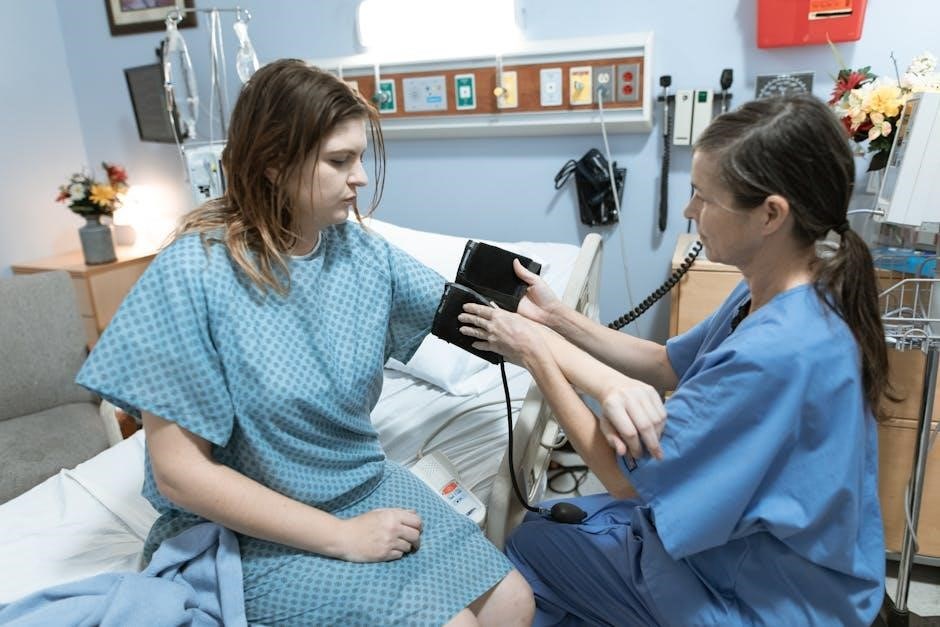Caregiver duties involve providing essential support to individuals needing assistance‚ ensuring their well-being through personal care‚ health management‚ and emotional support.
Understanding these responsibilities is crucial for creating structured care plans and checklists to manage daily and long-term tasks effectively.
Overview of Caregiver Roles and Responsibilities
Caregivers play a vital role in supporting individuals who require assistance with daily activities‚ whether due to age‚ disability‚ or illness. Their responsibilities encompass a wide range of tasks‚ from personal care and hygiene to health management and emotional support. Caregivers ensure the well-being of their care recipients by addressing both physical and emotional needs.
In addition to direct care‚ caregivers often handle household management‚ transportation‚ and errands. They may also act as advocates‚ coordinating medical appointments and communicating with healthcare providers. The role requires patience‚ compassion‚ and strong organizational skills to balance multiple responsibilities effectively.
While family caregivers often take on these duties out of love and commitment‚ professional caregivers provide specialized support‚ focusing solely on the care recipient’s needs. A structured caregiver duties checklist can help organize tasks‚ ensuring consistency and reducing overwhelm. This role is both challenging and rewarding‚ making caregivers indispensable in their communities.
Importance of Understanding Caregiver Duties
Understanding caregiver duties is essential for ensuring the well-being of care recipients and maintaining the caregiver’s own mental and physical health. Caregiving is a multifaceted role that requires a clear grasp of responsibilities to provide effective support. Without a proper understanding‚ caregivers may feel overwhelmed‚ leading to burnout or inadequate care.
A structured approach to caregiver duties helps in prioritizing tasks‚ managing time‚ and balancing personal and professional life. It also ensures that the care recipient’s needs are met consistently‚ improving their quality of life. Additionally‚ understanding these responsibilities enables caregivers to advocate effectively for their care recipients and communicate clearly with healthcare providers.
Recognizing the importance of caregiver duties fosters a supportive environment for both the caregiver and the individual in need‚ promoting a positive and sustainable caregiving experience.

Primary Caregiver Duties and Responsibilities
Primary caregiver duties include personal care‚ health management‚ and emotional support‚ ensuring the care recipient’s well-being and quality of life through tailored assistance and compassionate care.

Personal Care and Hygiene Assistance
Personal care and hygiene assistance are fundamental aspects of caregiving‚ ensuring the care recipient maintains dignity and independence. This includes helping with bathing‚ dressing‚ grooming‚ and incontinence care.
Caregivers may also assist with oral hygiene‚ nail care‚ and hair maintenance‚ adapting to the individual’s specific needs and preferences. These tasks require patience‚ empathy‚ and attention to detail.
While some caregivers may agree to additional household chores for extra compensation‚ their primary focus should remain on the care recipient’s personal needs‚ not general cleaning or maid services.
By providing personalized support‚ caregivers play a vital role in enhancing the quality of life for those who require assistance with daily living activities.

Health Management and Medication Administration

Health management and medication administration are critical caregiver duties‚ ensuring the care recipient adheres to their medical regimen. This includes administering prescribed medications‚ monitoring dosages‚ and maintaining accurate records.
Caregivers must also monitor the individual’s health condition‚ watch for side effects‚ and communicate changes to healthcare providers. Following a structured healthcare plan is essential to prevent complications and improve overall well-being.
Additionally‚ caregivers may assist with scheduling medical appointments‚ managing medical supplies‚ and ensuring the care recipient follows dietary restrictions. These tasks require attention to detail and strong organizational skills.
By effectively managing health and medications‚ caregivers play a pivotal role in maintaining the care recipient’s quality of life and preventing potential health crises.
Emotional Support and Companionship
Emotional support and companionship are vital aspects of caregiver duties‚ focusing on the mental and emotional well-being of the care recipient. Caregivers provide comfort‚ reassurance‚ and a sense of connection‚ which are essential for reducing feelings of loneliness and isolation.
This includes engaging in conversations‚ sharing activities‚ and creating a supportive environment. Caregivers also help individuals cope with stress‚ anxiety‚ or depression by offering empathy and understanding. Companionship can involve simple acts like watching movies‚ playing games‚ or going for walks‚ which foster a sense of normalcy and joy.
By addressing emotional needs‚ caregivers play a significant role in improving the care recipient’s quality of life and overall well-being. This aspect of caregiving is often as important as physical care‚ ensuring the individual feels valued and supported.
Additional Responsibilities of Caregivers
Beyond primary duties‚ caregivers often manage household tasks‚ transportation‚ and errands‚ ensuring a safe and comfortable living environment for the care recipient.
Household Management and Chores
Household management is a key aspect of caregiver duties‚ ensuring a clean‚ safe‚ and organized living environment for the care recipient.
- Caregivers often handle laundry‚ cleaning‚ and meal preparation to maintain daily routines.
- Light housekeeping‚ such as dusting‚ vacuuming‚ and sanitizing‚ is essential for hygiene and comfort.
- Managing groceries‚ including shopping and organizing supplies‚ is another critical task.
- Some caregivers may also assist with yard work or pet care‚ depending on the individual’s needs.
While these tasks support the care recipient‚ it’s important to distinguish between caregiving and maid services‚ as caregivers focus on the individual’s well-being rather than extensive cleaning.
Transportation and Errands
Transportation and errands are essential caregiver duties‚ ensuring the care recipient can access necessary services and maintain their quality of life.
- Driving the individual to medical appointments‚ therapy sessions‚ and social events is a primary responsibility.
- Caregivers often handle grocery shopping‚ picking up prescriptions‚ and running other errands to support daily needs.
- Assisting with scheduling appointments and managing transportation logistics is also part of this role.
- In some cases‚ caregivers may help with pet care or other household-related tasks that require transportation.
These tasks not only ensure practical needs are met but also provide emotional reassurance and independence for the care recipient.
Creating a Caregiver Duties Checklist
A caregiver duties checklist is a structured guide outlining daily‚ weekly‚ and occasional tasks to ensure comprehensive care‚ including personal hygiene‚ medication reminders‚ and emotional support.
Daily and Weekly Tasks
Daily tasks for caregivers often include assisting with personal hygiene‚ preparing meals‚ administering medications‚ and providing companionship. These activities ensure the individual’s immediate needs are met consistently.
Weekly tasks may involve scheduling medical appointments‚ managing household chores‚ and ensuring the living environment remains safe and clean. These responsibilities help maintain a structured and supportive routine.
By organizing these tasks‚ caregivers can efficiently manage their duties‚ ensuring the well-being of their loved ones while maintaining their own balance and reducing stress.

Occasional and Long-Term Responsibilities

Occasional responsibilities for caregivers may include handling unexpected medical emergencies‚ coordinating with healthcare providers‚ or managing changes in the care recipient’s condition. These tasks require adaptability and quick decision-making.
Long-term responsibilities involve planning for future care needs‚ such as exploring alternative living arrangements or ensuring financial resources are in place. Caregivers must also advocate for the individual’s wishes and ensure their quality of life remains a priority.
These responsibilities highlight the importance of being proactive and prepared‚ as they play a critical role in maintaining the well-being of the care recipient over time.

Understanding the Role of a Caregiver
Understanding the role of a caregiver involves recognizing the blend of personal and professional aspects‚ providing emotional and physical support‚ and balancing these responsibilities with compassion and dedication.
Family Caregivers vs. Professional Caregivers
Family caregivers often provide emotional and personal support‚ managing daily tasks and health needs‚ while professional caregivers offer specialized skills and structured routines‚ ensuring comprehensive care and adherence to medical plans.
The Importance of a Structured Caregiver Duties Checklist
A structured caregiver duties checklist is essential for ensuring consistency and accountability in providing care. It serves as a comprehensive guide‚ outlining daily‚ weekly‚ and occasional tasks such as personal hygiene‚ medication reminders‚ and meal preparation; By organizing responsibilities‚ caregivers can manage time effectively and prioritize tasks‚ reducing stress and improving the quality of care. A checklist also helps track progress‚ ensuring no important duties are overlooked. It fosters clarity and communication‚ especially when multiple caregivers are involved. Additionally‚ it provides a sense of accomplishment as tasks are completed. Overall‚ a well-structured checklist enhances efficiency‚ reduces overwhelm‚ and ensures the individual receiving care enjoys a better quality of life. It is a vital tool for both family and professional caregivers‚ aiding in the delivery of compassionate and reliable support.

Tips for Managing Caregiver Duties Effectively
Effective management of caregiver duties requires prioritization‚ time organization‚ and self-care. Balancing tasks‚ seeking support‚ and maintaining a structured routine ensures efficiency and reduces stress.
Time Management and Prioritization

Effective time management is crucial for caregivers to balance multiple responsibilities. Prioritizing tasks ensures essential duties are completed efficiently‚ reducing stress and improving overall care quality. Creating a daily schedule helps allocate time for personal care‚ medication administration‚ and emotional support. By focusing on high-priority tasks first‚ caregivers can manage their workload better and avoid burnout. Additionally‚ leveraging tools like checklists or apps can enhance organization and ensure no critical tasks are overlooked. Proper time management also allows caregivers to maintain their own well-being‚ which is vital for providing compassionate and consistent support. Balancing urgency and importance helps caregivers navigate the demands of their role effectively‚ ensuring both the care recipient and the caregiver thrive.
Self-Care for Caregivers
Self-care is essential for caregivers to maintain their physical‚ emotional‚ and mental well-being. Neglecting self-care can lead to burnout‚ reducing the quality of care provided. Caregivers must prioritize activities that recharge their energy‚ such as exercise‚ meditation‚ or hobbies. Setting boundaries and seeking support from family‚ friends‚ or support groups can alleviate stress. Taking regular breaks and delegating tasks when possible are vital for sustainability. Recognizing the importance of self-care ensures caregivers can continue providing compassionate and effective support without compromising their own health. By prioritizing self-care‚ caregivers create a healthier balance between their responsibilities and personal needs‚ benefiting both themselves and those they care for.
Caregivers play a vital role in supporting loved ones‚ managing daily tasks‚ and providing emotional care. Their dedication requires balance‚ self-care‚ and support to ensure sustainable‚ compassionate assistance.
Summarizing Key Caregiver Responsibilities
Caregivers are essential in providing personalized support‚ ensuring the well-being of individuals in need. Their primary responsibilities include assisting with personal care‚ managing health needs‚ and offering emotional support. They also handle household tasks‚ transportation‚ and errands‚ creating a structured environment for daily and long-term care. A caregiver duties checklist helps organize these tasks‚ ensuring consistency and thoroughness. Whether a family member or professional‚ caregivers must balance compassion with practical skills‚ adapting to unique needs. Effective time management and self-care are crucial to sustain their role. Understanding these responsibilities highlights the importance of their work in improving quality of life for those they care for.
Final Thoughts on the Role of Caregivers
Caregivers play a vital role in enhancing the quality of life for individuals in need‚ offering compassion‚ support‚ and essential care. Their dedication ensures that daily tasks‚ health management‚ and emotional well-being are prioritized. Whether family members or professionals‚ caregivers must maintain a balance between their responsibilities and self-care to avoid burnout. Structured checklists and effective time management are key to their success; The role of caregivers is not only practical but also deeply personal‚ requiring empathy and adaptability. Their contributions are invaluable‚ making a significant difference in the lives of those they support. Recognizing their efforts and providing resources for their well-being is essential to sustaining their important work.
